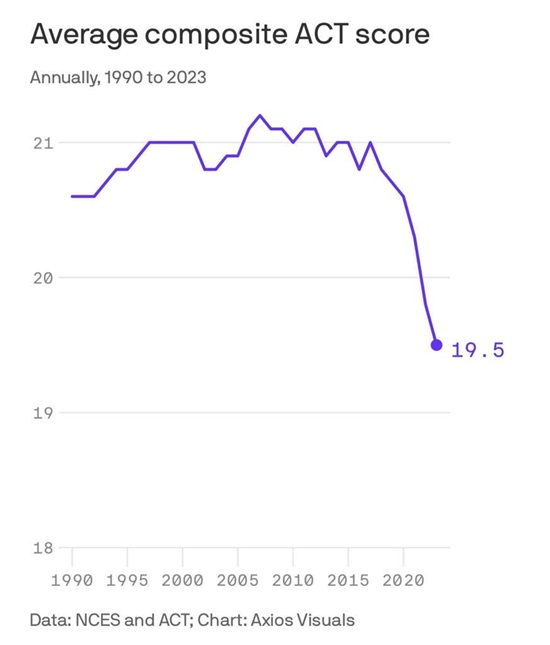US High School student's standards plummet-opportunity for Indian scholars...by KBS Sidhu
ACT test scores fall to lowest levels since 1991— Opportunity for Indian students.
Introduction: The Declining ACT Scores
Official data published earlier this month indicates that the average ACT scores for the U.S. class of 2022 have plummeted to their lowest levels since 1991. This decline is concerning not only for its immediate implications on college admissions but also as a gauge for assessing the educational preparedness of American students, particularly in an era where groundbreaking AI innovations are emerging almost weekly.
What is the ACT?

The ACT (American College Testing) is a standardized test used for college admissions in the U.S. Comprising four main sections—English, Mathematics, Reading, and Science—it aims to assess high school students' readiness for college. Scores range from 1 to 36 and are a key factor in college admissions, scholarship eligibility, and course placement. It is roughly equivalent to our JEE (Joint Entrance Examination) for admission to the IITs.
The Pandemic's Role
While the global pandemic has affected every facet of life, its detrimental impact on education has been profound. The drop in ACT scores for the class of 2022 is being seen as another repercussion of COVID-19. However, ACT CEO Janet Godwin points out that this decline has been in motion for at least five years, highlighting systemic issues in the American educational landscape.
Beyond COVID-19: Systemic Failures
The decrease in ACT scores is not a phenomenon triggered solely by the pandemic. Rather, it is symptomatic of long-standing systemic issues that have been worsened by recent events. A decline in the number of students taking the ACT—30% since 2018—is indicative of deeper, underlying issues in American education.
The Controversy Around Standardised Testing
Standardized tests like the ACT have always been contentious. Critics argue that these tests are skewed in favor of affluent students and are unfair to minority students. This view has gained traction in light of the latest data, strengthening the case for a re-evaluation of how readiness for higher education is measured.
Comparing Global Talent: The Case of India
In stark contrast to this trend, students from premier Indian institutes like the IITs and IIMs continue to perform exceptionally well, particularly in the United States. Their performance, when compared to an average American college graduate, is often significantly higher.
This can be attributed to rigorous academic training a highly competitive selection process and the fact that only the top 1 percentile of the candidates are able to secure admission into these prestigious institutions of India.
India's Growing Influence in the U.S. Job Market
Since 2014, under the Narendra Modi government, India has substantially expanded the number of seats in the IIT system while maintaining rigorous teaching and testing standards. Owing to their high proficiency in both written and spoken English, these students consistently outperform their traditional competitors—Chinese scholars.
Consequently, India is well-positioned to become a dominant force in the U.S. job market.
Although the presence of Indian-origin CEOs at the helm of numerous U.S. tech and non-tech companies is frequently highlighted in the media and on social media, this dominance extends to all levels, starting with the positions for which fresh graduates are recruited by these companies.
Conclusion: Re-thinking Educational Metrics and Global Competitiveness
The decline in ACT scores is a wake-up call for the United States to address its educational challenges. At the same time, it opens up the floor for a broader dialogue on the metrics used for educational readiness.
While the U.S. grapples with this, countries like India are steadily gaining ground, not just in terms of academic performance but also in their influence on global job markets.
The changing dynamics highlight the need for the U.S. to reassess its educational policies and to be aware of the growing competition from countries that are effectively harnessing their educational systems to meet global challenges.
October 27, 2023
-

-
KBS Sidhu, Former Special Chief Secretary, Punjab
kbssidhu@substack.com
Disclaimer : The opinions expressed within this article are the personal opinions of the writer/author. The facts and opinions appearing in the article do not reflect the views of Babushahi.com or Tirchhi Nazar Media. Babushahi.com or Tirchhi Nazar Media does not assume any responsibility or liability for the same.